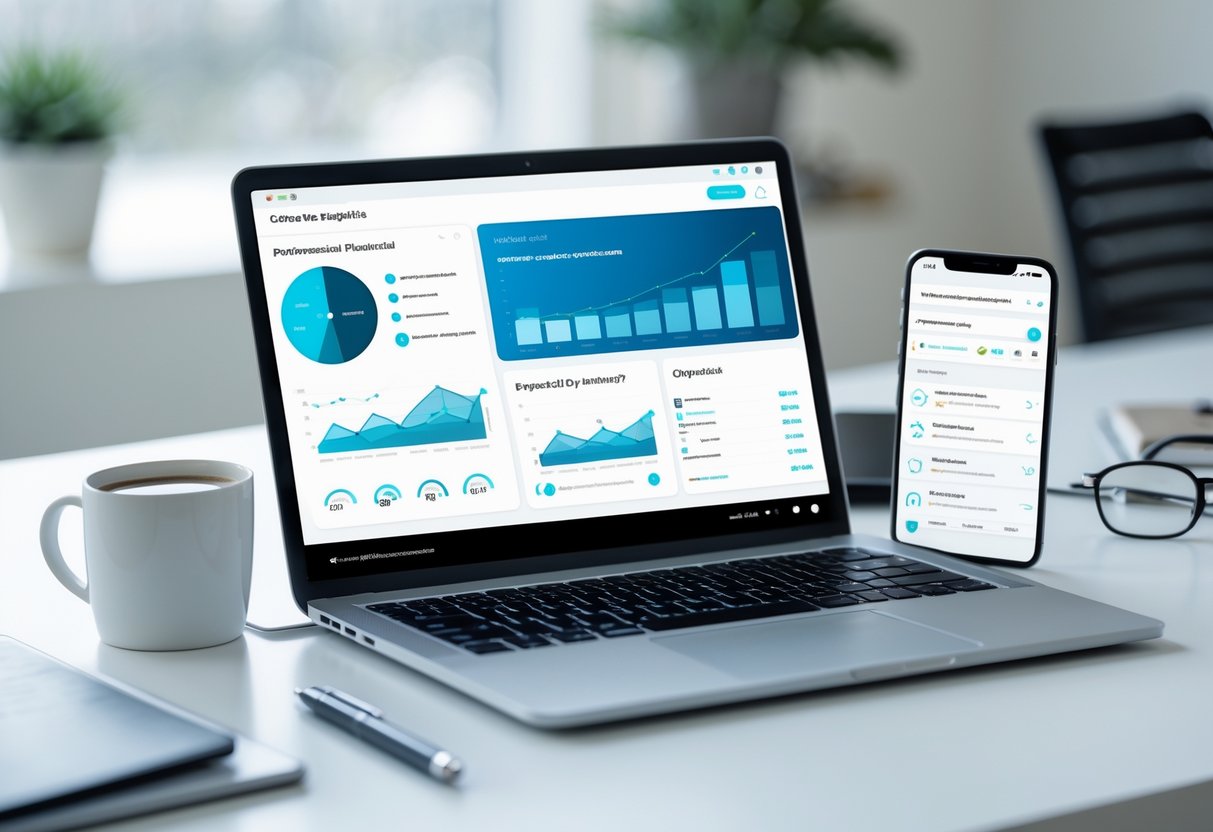Starting a business these days? You don’t need to rent a shop or hire a big team. You can launch something right from your laptop, thanks to platforms that connect you with customers, partners, and all sorts of growth tools.
Business opportunity platforms make it way easier to start, run, and scale a business—online or in person—without dropping a fortune upfront.

I’ve watched platforms like Shopify, Etsy, and Fiverr help regular folks turn ideas into real income streams. These tools open up global markets and automation features, plus analytics that used to be reserved for the big guys.
Whether you’re selling handmade goods, digital services, or content, the right platform can turn your skills into a steady business.
New tech keeps pushing the boundaries. AI, automation, and app-based platforms now let small businesses compete with much bigger ones. If you pick the right system, you’ll save time, cut costs, and maybe discover opportunities you didn’t even know existed.
Key Takeaways
- Business opportunity platforms make starting and running a business way less intimidating.
- The right tools can turn your skills and ideas into actual income.
- Tech trends keep expanding what’s possible—it’s only getting better.
Understanding Business Opportunity Platforms
I see business opportunity platforms as systems that connect people, resources, and tech to create value through interaction. They help companies grow by giving better access to markets, data, and collaboration tools.
Definition and Core Features
A business platform is basically a digital or physical environment where two or more groups—like buyers and sellers—can interact directly. It’s all about making exchanges easier and knocking down barriers.
The big features? Connectivity, scalability, and data-driven insights. These mean everyone can share info and do business smoothly.
A lot of platforms thrive on network effects—the more people join, the more valuable it gets. Platform-based ecosystems link businesses and customers instantly, which is pretty powerful.
Some platforms also pack in automation and analytics to personalize experiences and help you make smarter decisions. This kind of setup keeps organizations nimble, even as markets shift.
Types of Business Platforms
Business platforms aren’t all the same. Vivaldi Group breaks them down into four main types:
| Type | Description | Example |
|---|---|---|
| Aggregation platforms | Connect users for transactions or tasks | eBay |
| Social platforms | Build communities around shared interests | |
| Mobilization platforms | Coordinate long-term projects or goals | Supply chain networks |
| Learning platforms | Encourage collaboration and knowledge sharing | Online education hubs |
Each type supports a different goal. Aggregation platforms are great for quick deals, while mobilization platforms help with big-picture cooperation.
Picking the right platform type really shapes how your business connects with its market. I think it’s a decision that deserves some real thought.
Platform Business Models
A platform business model isn’t about making stuff yourself—it’s about bringing people together to exchange value. The platform acts as an ecosystem where everyone benefits from shared infrastructure and rules.
Unlike old-school business models, platforms make money from multiple streams—transaction fees, ads, or even data insights. Traditional vs. Platform-Based Business Models lays out how this approach changes the game by focusing on relationships, not just ownership.
A lot of successful platforms use open interfaces and APIs to draw in partners and developers. That openness keeps the innovation flowing and the business flexible.
Honestly, I’ve found that platform models let companies scale faster and reach more people. If you want a competitive edge, it’s a smart move.
Key Online Business Opportunity Platforms

I’m all about digital platforms that let you earn money on your own terms and reach customers online. These systems make it simple to sell goods, offer services, or deliver products—no need for a storefront or a big staff.
E-Commerce Marketplaces
E-commerce platforms give me the tools to sell products to people all over the world. Sites like Amazon FBA and Etsy handle logistics, payments, and getting your stuff seen. That way, I can focus on making great products and marketing them.
Amazon FBA takes care of storage, packing, and shipping. If you want to scale and access millions of shoppers, it’s hard to beat.
Etsy is perfect for handmade and creative goods. It’s where small creators keep their brand identity and connect with niche buyers.
When I compare options, I always check the fees, fulfillment support, and how many customers I can reach. Shopify’s business opportunities and Forbes’ overview of online business models both show e-commerce is still one of the most reliable ways to build an online business.
| Platform | Best For | Key Advantage |
|---|---|---|
| Amazon FBA | High-volume sellers | Automated fulfillment |
| Etsy | Artisans and crafters | Niche audience |
| Shopify | Independent brands | Full control of storefront |
Gig Economy Platforms
The gig economy lets me make money by offering my skills or time on my own schedule. Platforms like Upwork, Fiverr, and TaskRabbit connect freelancers with clients who need quick help—writing, design, repairs, you name it.
I get to pick my projects and set my rates. That flexibility is a lifesaver for anyone juggling multiple gigs or life commitments.
For drivers and delivery folks, gig apps open up another income stream. Uber, DoorDash, and Instacart all offer on-demand work with quick payouts.
Nas.io’s guide to building online businesses says it best: match your skills to what’s in demand, and always check the fees before you commit.
App-Based Delivery and Rideshare
Delivery and rideshare apps make it easy to find steady demand from people who want convenience. Uber lets me earn by giving rides, while DoorDash and Instacart pay me to deliver food and groceries.
These platforms handle route planning, payments, and customer support. All I need is a car, a phone, and the right paperwork.
Managing costs like gas and maintenance is the main challenge. But if I work during peak hours or in busy areas, I can boost my earnings.
A lot of people use these gigs to fund their bigger dreams—like launching an e-commerce shop or a creative project. Why not let the apps bankroll your next step?
Print-on-Demand and Creative Marketplaces
Print-on-demand platforms let me design and sell products without ever touching inventory. Sites like Redbubble, Teespring, and Printful connect my art to customers who want custom shirts, mugs, or posters.
When someone orders, the platform prints and ships it automatically. No need to buy stock upfront—so there’s almost zero risk.
Creative marketplaces like Etsy also support this model, giving artists a home for digital downloads, artwork, and handmade goods.
Ecommerce Industry Review’s list of top opportunities points out that automation and customization make print-on-demand a smart choice for designers who want to grow without managing production headaches.
Leveraging Artificial Intelligence and Digital Tools
I use artificial intelligence and digital tools to spot opportunities, serve customers better, and automate boring tasks. These tools help me make quicker decisions, avoid mistakes, and stay sharp in a changing market.
AI Tools for Business Platforms
I lean on AI tools to collect and analyze data so I know where demand is hot. Platforms that use AI-powered analytics let me spot trends in customer behavior and market activity. AI in business can help predict what’s coming and make everything run smoother.
I’ve used machine learning models to forecast sales and manage inventory. That way, I can tweak my strategy before anything goes sideways.
| AI Tool Type | Primary Function | Business Benefit |
|---|---|---|
| Predictive Analytics | Trend forecasting | Better planning |
| Chatbots | Customer interaction | Faster responses |
| Process Automation | Task execution | Lower costs |
These tools give me real insights for better decisions and smarter resource use.
Enhancing Customer Experience with AI
AI helps me personalize every customer interaction. With AI-driven recommendations, I can show people the products or services that actually fit their needs. That keeps customers happy and coming back.
Using digital tools from Leveraging Digital Tools and Technologies for Business Development, I track customer feedback and tweak my approach on the fly.
AI chatbots answer common questions instantly and never sleep. That frees me up to handle the tricky stuff.
By digging into engagement data, I can refine my marketing and make content that really resonates. It’s how you build trust and keep relationships strong.
Gaining a Competitive Edge Through Automation
Automation keeps me ahead by boosting speed and accuracy. I use AI-driven workflow tools for repetitive chores like data entry, reporting, and scheduling.
AI for Business: Essential Tools, Trends, and Insights says that automation makes businesses more efficient and agile. I see it every day—when I automate, I grow faster without needing to hire more people.
AI also watches my performance metrics 24/7. I can spot problems early and fix them before they cost me.
When I combine automation with smart planning, I’m always ready for whatever the market throws at me.
Opportunities for Small Businesses and Entrepreneurs

I’m always looking for ways small businesses can use these platforms to create new revenue streams, scale up, and pick the right tools for long-term growth. These platforms connect you with funding, mentorship, and digital resources that make a real difference.
Revenue Streams and Monetization
I hunt for business opportunity platforms that help me earn from multiple sources. Some offer affiliate programs, digital product sales, or subscription services that keep money coming in every month.
Platforms like SoFi’s small business grants and programs highlight funding options that lower startup costs and free up cash for growth. Forbes’ list of grant websites points to opportunities for both new and growing ventures.
I also use data analytics tools to track what’s working. That way, I know which products or services bring in the most profit. By having multiple income channels and using real-time data, I keep cash flow steady—even when one thing slows down.
If you want to skip the hassle and get right to the good stuff, just contact me on Whatsapp for a consultation or to buy leads: +917303556188. Feel free to reach out—honestly, it’s way easier to get quality leads from someone who’s already done the hard work. Why struggle alone?
Scaling and Business Growth
When I think about scaling, I always look for platforms that actually help me grow—mentorship, funding, training, all that good stuff. Programs like Goldman Sachs 10,000 Small Businesses offer real education and capital, so I don’t have to reinvent the wheel every time I want to expand.
I’ve tried accelerators like Target Accelerators and Sephora Accelerate too, especially if you’re in consumer products or beauty. They mix up coaching, networking, and investor exposure, which honestly makes the whole scaling process less nerve-wracking.
To keep up with growth, I use customer relationship management systems and automation tools. These plug right into most platforms, so I can handle more clients without losing my mind or dropping quality.
If you’re tired of chasing leads and want to skip the hassle, just reach out to me on WhatsApp at +917303556188. Seriously—why do all the heavy lifting yourself? Feel free to contact me anytime for consultation or to buy leads that actually convert.
Choosing the Right Platform
Picking a platform really depends on where you’re at. If you’re just starting out, free resources like the U.S. Chamber of Commerce’s small business grants and programs page are a no-brainer.
For a business that’s growing, accelerators with mentorship and networking can make a world of difference.
I always check the platform’s eligibility, support options, and track record. If it doesn’t fit my industry or customer base, I move on.
Here’s a quick checklist I use:
| Criteria | Why It Matters |
|---|---|
| Funding access | Supports expansion and operations |
| Mentorship | Guidance from people who’ve done it |
| Networking | Opens doors and builds visibility |
| Tools & analytics | Helps me make smarter, faster calls |
If you’d rather skip the research and just get quality leads, ping me on WhatsApp at +917303556188. I’ll save you the headache.
Emerging Trends and Future Outlook

Platforms are getting smarter and more data-driven every year. Automation and analytics now help users spot opportunities quicker, so you don’t have to spend hours digging.
New Platform Innovations
Lately, it’s all about speed, integration, and insight. Most platforms now blend funding, market research, and networking, so you’re not bouncing between five different tools.
Developers have rolled out real-time analytics dashboards to track performance and highlight what’s actually making money. That way, you can move fast when something pops up.
Some platforms are even using blockchain for transaction transparency. Others have API connectivity that links your CRM, accounting, or e-commerce tools. Managing growth in one place just feels easier.
| Innovation Type | Benefit to Users |
|---|---|
| Blockchain Verification | Cuts down on fraud, builds trust |
| API Integration | Makes data sharing a breeze |
| Real-Time Analytics | Speeds up decision-making |
The Evolving Role of AI in Platforms
Artificial intelligence is everywhere now. AI tools watch how you use the platform, predict market shifts, and suggest business matches that actually fit.
The 2025 Business Outlook Report says AI is changing how we find growth paths and manage risk. Machine learning now helps platforms improve opportunity suggestions and cut down on repetitive tasks.
On top of that, AI takes customer personalization to a new level. It tweaks recommendations based on your goals, industry, and what you’ve done before. If you want an edge, this is it.
Shifting Consumer Behaviors
Consumers want things easy, transparent, and real. They’re looking for platforms that make finding opportunities simple, with data to back things up.
Insights from 10 Business Trends Shaping the Future show digital transformation and sustainability matter more than ever. People are leaning toward platforms that care about ethics and real impact.
I focus on user experience and features like verified reviews and open metrics. If you want to ride these trends instead of chasing them, just message me on WhatsApp at +917303556188. Let’s make your business life easier.
Frequently Asked Questions
I’m all about practical ways to find, assess, and use online platforms that connect entrepreneurs with investors or business ideas. I stick to trusted tools and clear evaluation methods, so I don’t waste time or money.
What are the top platforms for finding small business opportunities?
I usually go to ZenBusiness to check out legit business opportunities and dodge scams. Marketplaces like WebWorkrs are great for freelance and global options. They let me compare industries, startup costs, and what I might actually make.
Which platforms are best for startups seeking investors?
I look for investor networks built for early-stage companies. GrowthPal is solid for mergers, acquisitions, and deal sourcing. Crowdfunding sites focused on equity investments are also worth a look.
How do I identify credible business opportunity platforms for free?
I check if the platform shares company details, user reviews, and regulatory info. FAQ pages like Arise Platform help me see how they handle concerns. I always confirm registration with business bureaus or state agencies before sharing anything personal.
What criteria should I use to evaluate the best startup investment sites?
Transparency, security, and track record are non-negotiable for me. The best sites show how they screen deals, protect data, and list successful outcomes. I also look for low entry fees and clear communication.
Where can I find a reliable platform for angel investing?
I stick to platforms that vet both investors and startups. Angel networks often partner with verified deal platforms like GrowthPal. I want investor education tools and a real community before I sign up.
If you want leads or just don’t want to sift through endless platforms, contact me on WhatsApp at +917303556188. Feel free to reach out—honestly, why make it harder than it needs to be?
How can a startup business effectively attract investors through online platforms?
Startups need to grab attention fast, right? I always put together a business profile that’s clear and actually backed by data—nobody wants fluff.
I spell out the problem, the solution, and the money side of things, because let’s be honest, investors care about numbers. Growth projections? Gotta keep them realistic, not just wild dreams.
If you’ve got a solid team, show it off. People invest in people, not just ideas.
Platforms like WebWorkrs make it easier, but you can’t just post and ghost. I keep the conversation going, reply fast, and try to sound like an actual human being. That’s how you build trust and show you’re serious.
If all this feels like a lot, why not just reach out? I’ve got the leads and know-how to save you hours of hassle. Feel free to contact me on WhatsApp if you need consultation or want to buy leads—+917303556188. It’s honestly way easier to get started this way than doing it all yourself.



